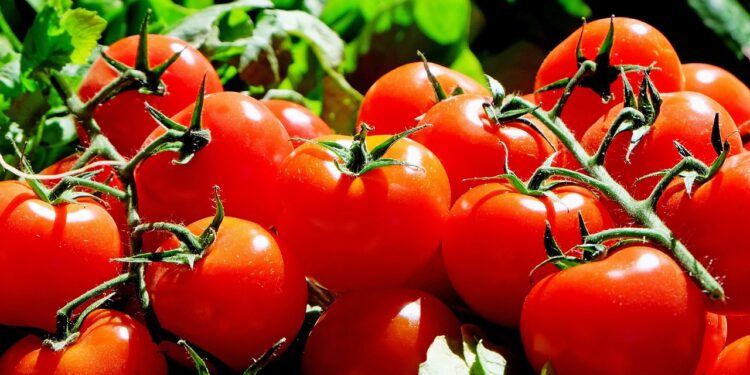Despite the country’s crushing misery, tomato farmers in Kano have made enormous profits from harvest earnings, marrying women, purchasing homes, farms, and motorcycles.
Kano tomato producers have generated tremendous profits from harvest earnings, marriages to women, and the acquisition of houses, fields, and motorbikes despite the severe poverty of their nation.
This comes after farmers suffered massive losses in the billions of Naira as a result of the unexpected invasion of the insects known as tuta absoluta. Mukhtar Kura, Chairman of M.K. Kura Farms, Butalawa, Kura Local Government Area, Kano State, revealed in a conversation with Vanguard that tomato farmers have never seen a bumper harvest as this in Kano State due to the massive cultivation of tomatoes.
Kura stated, “Yes, tomato growers are glad because most of them are able to support themselves and their families through their dry season harvests. The youth among them are getting married and purchasing houses, lands, and motorcycles; it is a happy time for them, and it motivates them to work harder when the rainy season begins.
“Abubakar, a native of the Kura/Garin Mallam area, where my farm is located, told me that he has never seen a season with so many tomatoes planted, especially with the string frame style of tomato cultivation that they are using.
More harvests are on their way, In Sha Allah. Meanwhile, he claims that a large basket of tomatoes now costs N16,000, down from almost N100,000 just four months ago. “Currently, a basket is not the primary measuring tool for tomatoes.
A certain sort of crate is utilised, and the price ranges between N7,000 and N8,000, depending on the quality of the tomatoes and the buyer. However, two full crates would fill a huge basket, so a big basket would price between N14,000 and N16,000.
However, he (Kura) advised farmers on how to protect their crops from tuta absoluta (Tomato Ebola), fertiliser application, and optimal agronomic techniques.

“First, before beginning a tomato farming project, a farmer should have complete capital preparation in order to meet all of the conditions for a plentiful harvest and to be able to protect his plants from injury at the appropriate moment.
“Secondly, a farmer should ensure that he obtains genuine fertiliser, as counterfeit products are on the rise, and sadly, many of our farmers are susceptible to falling for them.
“One of the repercussions of these poor fertilisers is that the tomatoes tend to fall down before their due time, resulting in significant losses. “Third, one should get professional guidance on the sort of farm where he plans to plant his tomatoes, particularly dry season tomatoes, because there are numerous parameters that must be considered for tomatoes to thrive, such soil PH, temperature, humidity, and so on. “Finally, and most crucially, farmers must be more watchful against pests, particularly during the dry season, when losses occur annually.
“This is why current farming practices, such as the string method, should be used; even if done locally, it is a good start. Going forward, other tomato irrigation technologies must be adopted.”
In the meantime, he urged the Kano State Government to get involved in the tomato value chain to address problems that farmers face and to increase output.”I would like to call on His Excellency Abba Kabir Yusuf, the Governor of Kano State, and Dr. Danjuma Mahmood, the Commissioner of Agriculture, to concentrate on important issues impacting our tomato producers, who play a crucial role in Kano’s agricultural sector.
“Three critical areas require urgent effort to improve tomato cultivation, raise yields, and maintain food security;
Farmers’ Education and Support: It is critical that our tomato growers are taught on current farming techniques that will help them enhance productivity while reducing risks like as crop failure and illness. Along with this, adequate farming equipment and tools must be provided, with sufficient supervision to ensure they are used efficiently and for the intended goals.
Examining Counterfeit Agriculture Products: The selling of fake seeds, fertilisers, and pesticides has been a growing source of worry. The government must put strong investigative mechanisms in place to target dishonest vendors of counterfeit goods. These destructive methods have a detrimental effect on food quality and yield in addition to endangering farmers’ livelihoods.
Support for Fertiliser: The majority of Kano State’s impoverished farmers find it difficult to afford fertilisers, which has a direct impact on crop productivity. We implore the government to offer targeted assistance in the form of cheap or free fertilisers so that even the less fortunate farmers can boost their yield and add to the state’s agricultural production.
“These steps would greatly benefit our local farmers, ensure food security, and strengthen Kano State’s economy.Avoiding these procedures would result in enormous losses, which have occurred on a yearly basis.
” The optimum months to cultivate tomatoes in Nigeria are December and March. Planting tomatoes in December, January, February, and March allows for harvesting during the lean months of May through August.Prices for tomatoes peak between May and August.
In Essence
The recent bumper harvest has allowed these farmers to improve their livelihoods by acquiring homes, marrying, and investing in transportation, which highlights the transformative potential of agriculture in poverty alleviation and rural development.
However, the underlying issues still need to be addressed to sustain this momentum.
The decline in tomato prices from N100,000 to N16,000 for a large basket shows how volatile agricultural markets can be, and farmers are vulnerable without proper value-chain management and government intervention.
The recommendation for better agronomic practices, pest management, and access to genuine fertilizers is crucial for maintaining productivity.

















